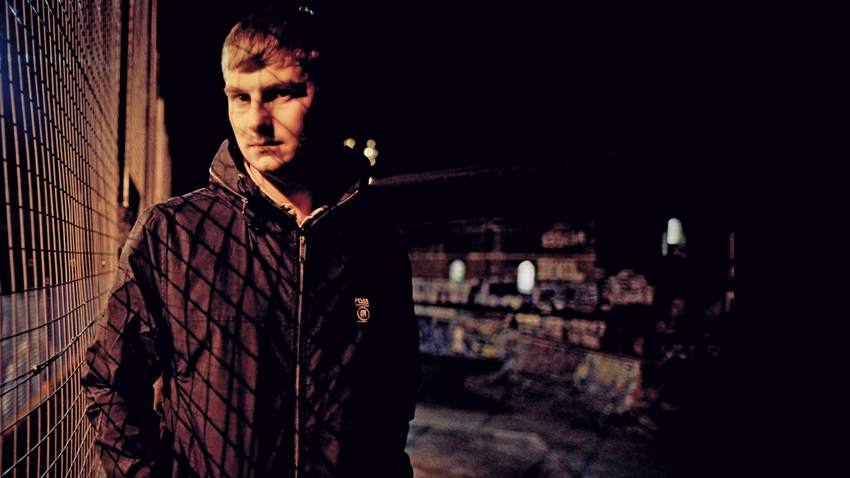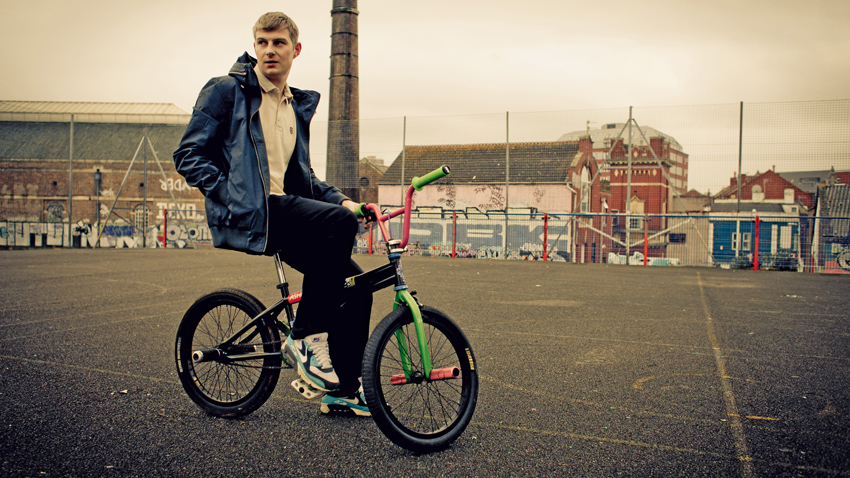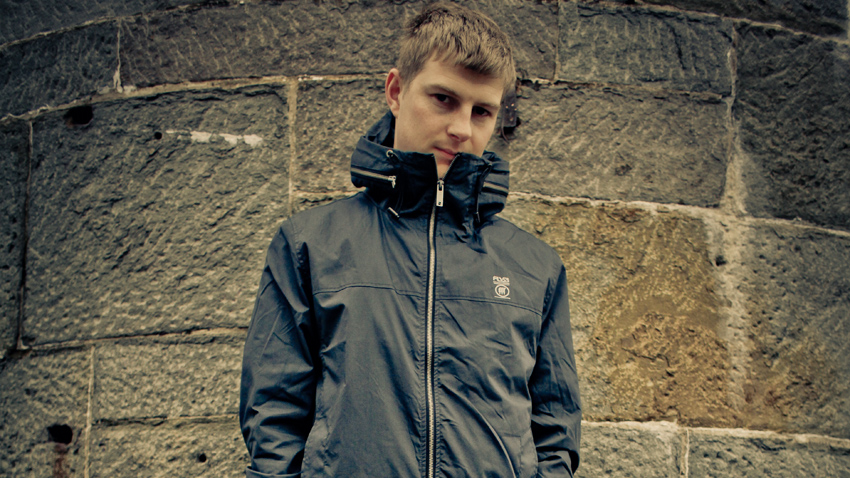Addison Groove talks synths, sampling and genre-hopping
"As soon as people think they've got me figured out, I like to move on to something new"

Born and bred Bristolian Tony Williams - formerly known as Headhunter and currently trading under the name Addison Groove - can remember the exact moment he fell in love with dance music.
"It was 1992, and I was ten years old," explains Williams. "A mate of mine had an older brother who collected these Fantazia rave tapes. One day, he was playing them and I just went, 'Woah, what's that?' It was the most alien thing I'd ever heard. I wasn't interested in the melodies or the words, I was just captivated by the noise of the drums. I didn't realise it at the time, but I'd just heard my first breakbeat!"
Some 22 years later, Williams is still listening to beats and has recently gathered a bunch together on his second album for Modeselektor's 50 Weapons label, Addison Groove Presents James Grieve (in case you're wondering, James Grieve is a traditional British apple!).
"At ten years old, did I think I'd be a professional musician?" muses Williams. "Ha! You're joking, aren't you?! Things like that didn't happen to people like me. I was living with my mum on a Bristol council estate... I used to nick my mate's brother's rave tapes 'cos I didn't even have enough money to buy my own. I've just been dead lucky: right place, right time and knowing the right people. Life's been good to me, and I'm very thankful for it."
So, how did that ten-year-old rave fan end up making his own tunes?
"That is a long, long story. It took me three or four years to save up enough money to buy my first bit of kit. I did a paper round, got a Saturday job and eventually bought a cheap turntable. Living in Bristol helped, because I could hear dance music all over the city. There were pirate stations like Ragga FM, and every car seemed have these beats blasting out the window. It was even in the charts!
"In the early 90s, you could hear stuff like the Prodigy, SL2 and Altern8 on Radio 1. Underground music was accessible to kids like me.
Want all the hottest music and gear news, reviews, deals, features and more, direct to your inbox? Sign up here.
"That's what's so cool about Britain. Underground club music can filter up into the mainstream. There have been amazing musical periods where the national charts have been full of great music that kids are also listening to. No one can do that like us."

You wanted to be a DJ in the early days?
"Yeah. Producing and making my own tunes still seemed a bit too far off in the distance. I remember buying a copy of Future Music and seeing a Novation Supernova on the front. I wanted one, but I actually had no idea what a synthesizer was and knew that I'd never have enough money to buy one. It was much easier for me to buy records, so that's what I did.
"I suppose I got a bit of a reputation as the young kid who bought vinyl, and I sort of got to know most of the people on the Bristol scene. People like Kosheen, Ice Minus, Tech Itch, Jakes [who runs Hench Records] and the Ruffneck Ting Crew. I even got asked to play out on Ragga FM - the station I'd first listened to all those years ago. Of course, I completely screwed up the mix. Man, I was so nervous that my hands were shaking for days.
"There were literally thousands of DJs out there and I realised that, if you wanted to be taken seriously, you had to get into producing, too."
"At some point, I must have realised there were literally thousands of DJs out there and that, if you wanted to be taken seriously, you had to get into producing, too. Somebody gave me a copy of Cubase, but I just couldn't get my head round it at all. The breakthrough came when Ice Minus lent me a copy of Reason.
"The beauty of Reason is that it looks like hardware, so you can sort of imagine how it all works. You've got your gear over here, and here's a mixing desk, and here's where you do your programming. I'm not saying I was any good, but at least I was starting to have a dabble."
What did those early tunes sound like? What were you listening to back then?
"I just immersed myself in the drum 'n' bass scene... Andy C, Ed Rush & Optical, then onto stuff like Bad Company. At the start, all I was trying to do was copy the drum 'n' bass tracks that I liked. I had no idea about musical theory or programming or anything like that. It was all at a really basic level: this is a sample, this is the kick drum, this is the snare and this is the bass. I didn't even understand keys. I was pulling different samples together, and they were all in different keys, but I thought it sounded brilliant.
"Ironically, it was my lack of musical talent that got people interested. They started saying, 'Mate, how did you think of putting those sounds together? They shouldn't work, but they do.' My ignorance became my strength."
The tune that got you noticed was (dubstep classic) 7th Curse, released in 2005 on Ascension, the label you ran with Tech Itch. Was that made on Reason?
"No, by then I'd shifted over to Logic. It wasn't just that Logic offered audio, it was also a better sound engine. I didn't have a soundcard back then, so I was just using an old MacBook, and things never seemed to sound fat enough. Again, it was Ice Minus who started showing me a few things in Logic, and I eventually started exporting my Reason songs over to Logic for the final mixdown. The Logic Overdrive immediately gave my tunes a bit more edge.
"That's how I worked for ages. The song was created in Reason and then taken over to Logic for a bit of spit and polish. I suppose I was still a bit worried about moving over to the world of VSTs and plugins, but it just seemed to happen naturally - I stopped using Reason completely and shifted over to Logic. I think it was Logic 5, and now I'm on Logic X."
Did you look at any third party add-ons, or did you just start getting to know Logic?
"Logic was more than enough for me, and I was actually really, really happy with a lot of the onboard stuff. To my ears, the ES2 is still one of the most useful soft synths out there. I did try things like Massive, but I just never got on with it.
"At some point, I had finally got myself a Supernova - it doesn't get used these days - and I liked to use Albino for basses, but most of my sounds came from samples. That was definitely my approach for all those early Headhunter tunes."
Pads, leads... all from samples?
"Yeah. I think it was because I was always worrying about money. I just didn't have the cash to spend on a bunch of new plugins every week, so I had to make do with what I'd got. The cheapest way of doing it was with samples. And, funnily enough, that also seemed to help me find my sound - a sound that was a bit different. Instead of getting the same pad that everyone else was getting from the latest soft synth, I was creating something from scratch using a sampler.
"You're probably thinking that I used the EXS24, aren't you? Unfortunately, I never seem to make things easy for myself. I've been using Battery for as long as it's been around. Not just for drums - I used it as my main sampler. Then, around 2008, somebody showed me Ableton [Live], and I couldn't believe how fast it was. Ableton became my new sampler. That's how I work today. I make beats in Logic using Battery, and I ReWire Ableton purely as a sampler. I don't even use Sampler... I just use Simpler. It's so easy to audition samples, and that helps me put a tune together really quickly.
"People always say, 'Why don't you just do everything in Logic?' but music doesn't always work like that, does it? You stick with a method that works best for you."

Is there anything else on the computer at all?
"It's mostly effects and processing. My main music-making computer is a Mac Mini, and that goes into a UAD Apollo, which was one of the best things I have ever, ever bought. I've got a ton of plugins on there, and the current favourite is probably the API preamp. As soon as I heard that, it went straight on my master outputs, with the gain almost up to maximum.
"Then there's the Roland Space Echo [RE-201], and a Pultec EQ - they're not cheap, but they really do sound fantastic. I've got the Studer [A800] and the Ampex [ATR-102], but they don't get used as much as they used to. A few bits of proper outboard, like the Culture Vulture and the Drawmer 1968."
No synths?
"Apart from what I've already mentioned, er... Oh, yeah, there's u-he Diva. I'm glad I've remembered that one because I honestly reckon it's the best-sounding soft synth I've heard in years. I suppose I should mention Kontakt, too. Although it's not my main sampler, I like the vintage sampling mode.
"God, I almost forgot the 808! Jesus, how could I forget that?"
A real one?
"Yeah, but often sampled. There's a track that opens the new album called Intro, and the 808 claves are all over that. I sampled them, tweaked them, stuck them through the Ableton Granulator, and they ended up sounding like rain. There's also the sound of sparkling water on that track... I literally stuck a mic in a cup of sparkling water. They're the first sounds you hear on the album!
"I always take the 808 out live, too, and it's interesting to hear how different it sounds compared with the drums in a finished and mastered track. The 808 really does sound rough and raw, but so powerful."
In those early dubstep days, had you worked out what a song needed to make it stand out? There's no denying that 7th Curse certainly got you noticed.
"Questions like that are always difficult to answer, because you can never be sure what's going to get your track noticed. If we go back to my drum 'n' bass days, I certainly knew that my tracks were not good enough; I knew that I didn't have anything constructive that I could contribute to the genre. But when I first heard dubstep, I felt like I had the germ of an idea.
"I was listening to people like Andy C, Ed Rush & Optical, but I was also listening to a lot of progressive trance. Suddenly, it occurred to me that most of the progressive trance tunes were running at 140bpm, just like dubstep. This light bulb went off in my head: what would happen if I took some of the techy sounds from my drum 'n' bass influences and some of the trancier bits from progressive trance and put them together with dubstep? I knew I was on to something - it felt like I was finding a sound."
Obviously, you eventually moved on from dubstep and from Headhunter - your first Addison Groove release was Footcrab in 2010. If people ask you what kind of music you're making in 2014, what do you say to them?
"I honestly don't know! But I think that's the same for a lot of people because dance music has splintered off into so many different styles and sounds. I try and keep my ear to the ground, but the boundaries between genres are just getting more and more blurred. You listen to a song and think, is it dubstep or trap? You ask for garage in a record shop and that covers so many different artists.
"Ideally, I'd like to carve out a bit of a niche that's just me doing my thing."
"Ever since Footcrab, I suppose people have associated me with juke and, yes, there was certainly a period where juke captured my imagination. The first time I saw it on YouTube, it had the same effect on me as those early rave tapes did. I couldn't quite understand it... couldn't even work out what tempo it was. It sounded totally bonkers! And I think it's natural to be drawn to something that sounds different to everything else you've heard."
The album, James Grieve, was probably a bit more melodic than people expected.
"I like that. As soon as people think they've got me figured out, I like to move on to something new. I'm already working on a new EP for 50 Weapons that will be released in the summer, and it's totally different to the album. The album was melodic and generally around 170bpm, but the new tracks are around 130 and very bashy, very clubby.
"Ideally, I'd like to carve out a bit of a niche that's just me doing my thing. What kind of music do I make? I make Addison Groove music."
Addison Groove Presents James Grieve is out now on 50 Weapons.


Computer Music magazine is the world’s best selling publication dedicated solely to making great music with your Mac or PC computer. Each issue it brings its lucky readers the best in cutting-edge tutorials, need-to-know, expert software reviews and even all the tools you actually need to make great music today, courtesy of our legendary CM Plugin Suite.
